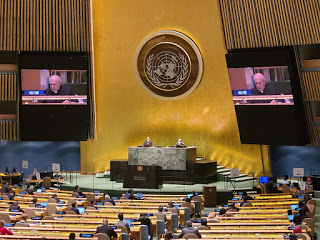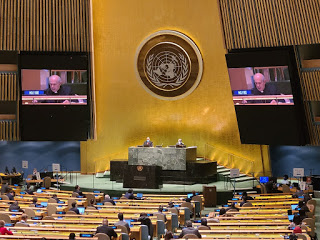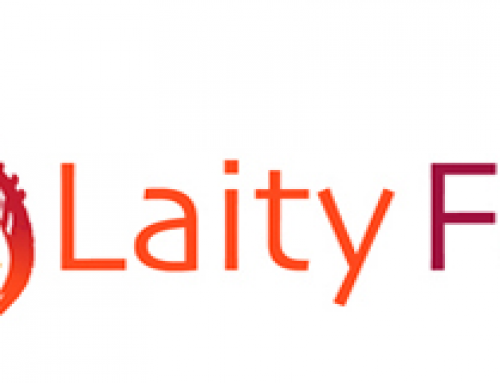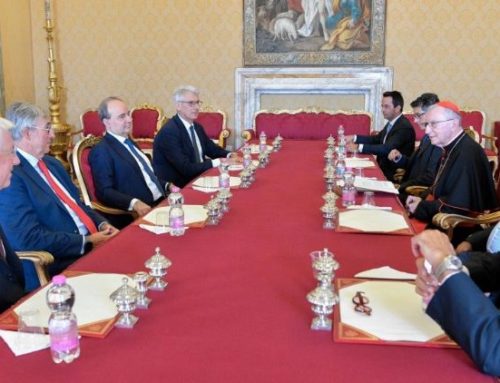
On December 14, Archbishop Gabriele Caccia gave a statement after the adoption of General Assembly resolution A/75/L.41, dedicated to “Global health and foreign policy: Strengthening Health System Resilience through Affordable Health Care for All.”
In his remarks, Archbishop Caccia said that the resolution was a reminder that we share a duty to care for one another, especially the poorest and most helpless, a situation that has become more acute during the COVID-19 pandemic.
The Holy See, he says, has consistently supported universal access to health care and, through the Catholic Church’s 100,000 healthcare institutions, offered it, especially in areas serving vulnerable populations.
He expressed the Holy See’s disappointment that the adopted declaration included the “divisive and deeply problematic reference” to “sexual and reproductive health and reproductive rights,” which he said weakens the resolution. His statement is below.
***
Archbishop Gabriele Caccia
Statement after Adoption of Resolution A/75/L.41
“Global Health and Foreign Policy:
Strengthening Health System Resilience
through Affordable Healthcare for All.”
UN Headquarters, 14 December 2020
Mr. President,
The Holy See would like to thank the delegation of Indonesia and the other Members of the core group of the Foreign Policy and Global Health initiative for their commitment to the consultation process.
The theme of “Strengthening health system resilience through affordable healthcare for all” has never been so timely. It reminds us that we share a duty to care for one another, especially the poorest and most helpless. To ensure that all people have access to the medical care they need is a concrete expression of solidarity, social justice and the common good.
Reflecting on the current historical moment marked by the COVID-19 pandemic, Pope Francis recently stated that “the fragility of world systems in the face of the pandemic has demonstrated that not everything can be resolved by market freedom.”[1]“Health is not a consumer good but rather a universal right and therefore access to healthcare services cannot be a privilege.”[2] The right to health is in fact universally recognized as a basic human right and is understood as comprising the health of the person as a whole and of all persons during all stages of development.
My delegation is pleased to see that this resolution emphasizes the impact that the pandemic has on the most vulnerable. It has made those who do not enjoy access to healthcare, in particular those with disabilities, the elderly, the migrants in precarious situations and refugees, even more vulnerable. The pandemic has also aggravated those situations where women and children are denied equal access to quality healthcare.
The Holy See strongly encourages common efforts aimed at ensuring that proper medical care and effective vaccines, free from ethical concerns, are affordable and promptly available in sufficient quantities, including in developing countries. Most low-income countries need the support of the international community to overcome funding shortfalls and assure the wellbeing of their respective populations.
Mr. President,
This resolution sets out important commitments to support the most vulnerable and to engage all relevant stakeholders in designing better health systems. It represents a significant step forward in our common efforts to provide every man, woman and child with healthcare.
The Holy See has never failed to support universal access to healthcare or, through the approximately one hundred thousand Catholic healthcare institutions throughout the world, to offer it, with the majority serving vulnerable populations living under adverse conditions.
The Holy See considers it most unfortunate, however, that the adopted declaration includes the divisive and deeply problematic reference to “sexual and reproductive health, and reproductive rights” as a component of universal health coverage. In line with our reservations expressed at the international conferences held in Beijing and Cairo, the Holy See reiterates that it considers the phrase “reproductive health” and related terms as applying to a holistic concept of health, which embraces the person in the entirety of his or her personality, mind and body. Moreover, the Holy See rejects the interpretation that considers abortion or access to abortion as dimensions of these terms, or of universal health coverage.
The inclusion of this troublesome phrase not only weakens the resolution but in fact contradicts it.
Thank you, Mr. President.
________________________________________
[1]Cfr. Pope Francis, Encyclical letter “Fratelli Tutti”.
[2]Pope Francis, Address to members of Doctors with Africa, 7 May 2016.







